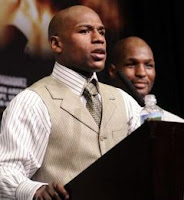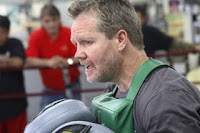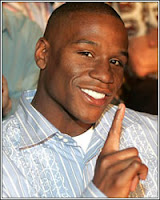
By Gary Andrew Poole Wednesday, Dec. 23, 2009
The talk of the fight world has been the March welterweight title clash between Manny Pacquiao and Floyd Mayweather Jr. Superlatives have been thrown around, including the likelihood of it being the most lucrative boxing match ever. But it may now well be the greatest fight that never was.
Pacquiao, the world's best pound-for-pound boxer, has a reputation for leaving his opponents in a bloody pulp, but his refusal to provide a blood sample before the bout — as demanded by the Mayweather camp — has led to an abrupt end to planning for the mega-matchup. The Filipino boxer, who has become an international sports icon, doesn't want his blood drawn within 30 days of the contest. Mayweather's team says the test is standard for Olympic athletes. However, Pacquiao and his trainer Freddie Roach believe any blood test close to the opening bell will weaken him. "We will abide by the [boxing] commission rules on a blood test after the fight and urine tests anytime," says Roach. He adds that Mayweather, who used to be the world's best pound-for-pound boxer, knows Pacquiao is very superstitious and doesn't like having his blood drawn close to fight night. A statement from Pacquiao's promoters specified that the Filipino fighter has already agreed to take blood tests as prescribed, including one in January when the fight was to have been officially announced; and one no later than Feb. 13, which is 30 days before the match. The additional blood test request, Roach claims, is as an excuse to scuttle the fight. "Mayweather doesn't dictate the rules, boxing commissions do; this is not something required in boxing," says Roach. "We're gonna knock this bum out, he knows it, and he is scared." (See pictures of the rise of Manny Pacquiao.)
The American boxer professed disappointment in a statement. "I understand Pacquiao not liking having his blood taken, because frankly I don't know anyone who really does," said Mayweather. "But in a fight of this magnitude, I think it is our responsibility to subject ourselves to sportsmanship at the highest level. I have already agreed to the testing and it is a shame that he is not willing to do the same. It leaves me with great doubt as to the level of fairness I would be facing in the ring that night."
But Mayweather is known to relish in getting under his opponent's skin. And, apart from the blowup on the part of Pacquiao's promoters, what Mayweather has done is inject an accusatory undertone of doping that is bound to irritate the Pacquiao camp, because it potentially tarnishes the seven-time champion's dramatic victories. "Mayweather is using this to harass Manny," says Bob Arum, Pacquiao's promoter. "This fight is down the drain. It makes no sense at all. My kid is clean as a whistle." (See the top 10 sports moments of 2009.)
Pacquiao has been called a once-in-a-lifetime fighter, and he has stolen much of the limelight from Mayweather. The Mayweather camp has been incredulous about Pacquiao's record. Pacquiao started his career at 106 lbs and has won seven championship belts in seven weight classes; he now fights at 144 lbs, almost a 40-lb swing. He is known for his ring artistry, in which he slips and slides in the ring like a ghost, strikes his opponent at so many angles and lands punches with concussive force.(See the meaning and mythos of Manny Pacquiao.)
But Mayweather is one of the smartest boxers around. "He is brilliant at draining the drama from a fight, but he also wins," says Larry Merchant, the HBO boxing analyst. By making a request that he expected Pacquiao to turn down, he may have proven that he is just as good a tactician outside the ring as in it. Or as Pacquiao enthusiasts may add, Mayweather is good at getting out of the ring as well.
If Pacquiao and Mayweather never meet in the fight, it will be a major body blow to boxing, a sport that seemed to gain mainstream momentum this year, mostly because of charismatic Pacquiao's rags-to-riches story. His November fight in Las Vegas against Miguel Cotto brought worldwide, and more importantly American, attention back to the fight game. After Pacquiao defeated Cotto there was immediate talk of a bout with Mayweather. The crowd at the MGM Grand in Las Vegas chanted, "We want Floyd! We want Floyd!" (See the rise of mixed martial arts: the new rules of fight club.)
It is difficult to imagine the two fighters, and particularly their promoters, walking away from a fight that could be the biggest payday of their careers, which Arum, the promoter, estimates could bring each fighter $40 million. The fight can be salvaged, Arum says, if a drug-testing compromise can be made between both camps. Arum says that in addition to boxing commission drug testing, Pacquiao is willing to have his urine examined by drug testing agencies that evaluate NBA, MLB and NFL players.
Read more: http://www.time.com/time/arts/article/0,8599,1949885,00.html#ixzz0ad1GmORAThe talk of the fight world has been the March welterweight title clash between Manny Pacquiao and Floyd Mayweather Jr. Superlatives have been thrown around, including the likelihood of it being the most lucrative boxing match ever. But it may now well be the greatest fight that never was.
Pacquiao, the world's best pound-for-pound boxer, has a reputation for leaving his opponents in a bloody pulp, but his refusal to provide a blood sample before the bout — as demanded by the Mayweather camp — has led to an abrupt end to planning for the mega-matchup. The Filipino boxer, who has become an international sports icon, doesn't want his blood drawn within 30 days of the contest. Mayweather's team says the test is standard for Olympic athletes. However, Pacquiao and his trainer Freddie Roach believe any blood test close to the opening bell will weaken him. "We will abide by the [boxing] commission rules on a blood test after the fight and urine tests anytime," says Roach. He adds that Mayweather, who used to be the world's best pound-for-pound boxer, knows Pacquiao is very superstitious and doesn't like having his blood drawn close to fight night. A statement from Pacquiao's promoters specified that the Filipino fighter has already agreed to take blood tests as prescribed, including one in January when the fight was to have been officially announced; and one no later than Feb. 13, which is 30 days before the match. The additional blood test request, Roach claims, is as an excuse to scuttle the fight. "Mayweather doesn't dictate the rules, boxing commissions do; this is not something required in boxing," says Roach. "We're gonna knock this bum out, he knows it, and he is scared." (See pictures of the rise of Manny Pacquiao.)
The American boxer professed disappointment in a statement. "I understand Pacquiao not liking having his blood taken, because frankly I don't know anyone who really does," said Mayweather. "But in a fight of this magnitude, I think it is our responsibility to subject ourselves to sportsmanship at the highest level. I have already agreed to the testing and it is a shame that he is not willing to do the same. It leaves me with great doubt as to the level of fairness I would be facing in the ring that night."
But Mayweather is known to relish in getting under his opponent's skin. And, apart from the blowup on the part of Pacquiao's promoters, what Mayweather has done is inject an accusatory undertone of doping that is bound to irritate the Pacquiao camp, because it potentially tarnishes the seven-time champion's dramatic victories. "Mayweather is using this to harass Manny," says Bob Arum, Pacquiao's promoter. "This fight is down the drain. It makes no sense at all. My kid is clean as a whistle." (See the top 10 sports moments of 2009.)
Pacquiao has been called a once-in-a-lifetime fighter, and he has stolen much of the limelight from Mayweather. The Mayweather camp has been incredulous about Pacquiao's record. Pacquiao started his career at 106 lbs and has won seven championship belts in seven weight classes; he now fights at 144 lbs, almost a 40-lb swing. He is known for his ring artistry, in which he slips and slides in the ring like a ghost, strikes his opponent at so many angles and lands punches with concussive force.(See the meaning and mythos of Manny Pacquiao.)
But Mayweather is one of the smartest boxers around. "He is brilliant at draining the drama from a fight, but he also wins," says Larry Merchant, the HBO boxing analyst. By making a request that he expected Pacquiao to turn down, he may have proven that he is just as good a tactician outside the ring as in it. Or as Pacquiao enthusiasts may add, Mayweather is good at getting out of the ring as well.
If Pacquiao and Mayweather never meet in the fight, it will be a major body blow to boxing, a sport that seemed to gain mainstream momentum this year, mostly because of charismatic Pacquiao's rags-to-riches story. His November fight in Las Vegas against Miguel Cotto brought worldwide, and more importantly American, attention back to the fight game. After Pacquiao defeated Cotto there was immediate talk of a bout with Mayweather. The crowd at the MGM Grand in Las Vegas chanted, "We want Floyd! We want Floyd!" (See the rise of mixed martial arts: the new rules of fight club.)
It is difficult to imagine the two fighters, and particularly their promoters, walking away from a fight that could be the biggest payday of their careers, which Arum, the promoter, estimates could bring each fighter $40 million. The fight can be salvaged, Arum says, if a drug-testing compromise can be made between both camps. Arum says that in addition to boxing commission drug testing, Pacquiao is willing to have his urine examined by drug testing agencies that evaluate NBA, MLB and NFL players.
Source:
time.com








.jpg)



.jpg)
.jpg)






